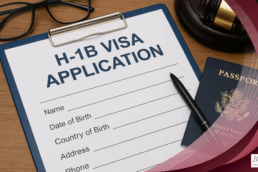H-1B Visa Lawyer For Specialty Occupations
The H-1B Visa is one of the broadest options for a work visa, because there are not many requirements that need to be met in order to qualify for eligibility. It permits an individual to work in the U.S. for up to 6 years, in increments of 3 years. After the 6 years are up, the visa holder has the option to apply for lawful permanent residency, also referred to as a green card.
What is an H-1B Visa?
The H-1B category is designated for temporary professionals to work in the U.S. in a “specialty occupation,” which is generally defined as a position that requires at least a Bachelor’s degree or the equivalent. The applicant must prove eligibility for the H-1B category with documentation of sufficient educational credentials, licensure, and/or experience.
Work authorization for H-1B foreign specialty workers is employer-specific (i.e., limited to employment with the approved employer/petitioner).
Numerical H-1B Visa Limitations
Each year, Congress limits the number of new H-1B nonimmigrants admitted to the U.S., and it is currently capped at 65,000. An additional 20,000 H-1B visas are available for individuals with a U.S. Master’s degree or higher. Each year, USCIS accepts petitions beginning April 1st for a 90 day period. Petitions are subject to random lottery selection for review and adjudication. If the application is approved, the H-1B visa will be valid for use beginning October 1st. If an individual is already in the U.S., they can request a change of status with the H-1B petition to become valid on this new date. Upon approval, if someone departs the U.S. or has not yet entered the U.S., the applicant must attend a visa appointment at a U.S. Consulate or Embassy abroad (unless Canadian) before they can enter the U.S. on H-1B status.
Berardi Immigration Law represents several individual and corporate entities that are exempt from the H-1B numerical cap. H-1B workers who are petitioned for or employed at an institution of higher education or its affiliated or related nonprofit entities, a nonprofit research organization, or a government research organization are not subject to this numerical cap.
Prerequisites to Filing an H-1B Petition
There are numerous obligations of an H-1B employer that must be considered:
- The petitioner must be a viable entity that can pay the applicant the prevailing wage for someone in a similar position in the location where the work is primarily performed.
- A Labor Condition Application (LCA, or ETA Form 9035) must be certified by the Department of Labor (DOL) before the petition is submitted to USCIS.
- The employer must also document compliance with the LCA requirements in a Public Access File (PAF). The LCA and PAF contain standard attestations that the employer must make, as well as basic wage and location information about the proposed H-1B employment, including rate of pay, period of employment, and work location.
What is Dual Intent?
An individual may apply for permanent residency (green card) and hold H-1B nonimmigrant status simultaneously. Most non-immigrant visas require individuals to prove that they do not intend to stay in the U.S. permanently. The H-1B Visa is an exception because it allows individuals to work temporarily in the U.S., and also allows them to pursue a green card at the same time without violating their visa status.
There are many benefits of having dual intent. H-1B holders can apply for a green card, likely through the PERM process, while remaining in legal status. H-1B holders are also allowed to travel internationally with a pending green card, as long as they have an H-1B Visa stamp. Lastly, for some non-immigrant work visas, there is a requirement to prove ties to their home country, but an H-1B holder does not have to prove any ties to their home country.
Dependents of H-1B Visa Holders
Dependents (spouses and unmarried children under 21 years of age) of H-1B workers are entitled to H-4 status with the same restrictions as the principal. There are some limitations for H-4 Visa holders. They are not automatically permitted to work, and must file an application requesting an EAD (Employment Authorization Document) once they do become eligible. The status of the H-1B holder is contingent on that of the H-4 Visa holder; if the primary holder’s employment is terminated, the H-4 becomes invalid. Lastly, if a spouse on H-4 status wants to pursue H-1B employment, they must go through the H-1B lottery process. Those on H-4 status only become eligible for work authorization once the H-1B-holding spouse has completed the preliminary steps of the green card process.
How to Apply For an H-1B Visa
- Find a U.S. Employer to Sponsor You
- The job must be a specialty occupation requiring a bachelor’s degree or higher in a related field
- Have your Employer register for the H-1B Lottery
- Employers must register online on behalf of the employee
- If selected, the employer can proceed with the petition
- Employer Files Labor Condition Application and Form I-129
- LCA ensures that working conditions and wages are fair
- I-129 Form includes information about the accepted job offer, and is
- Wait for Processing
- The petition will be processed by USCIS within a few months (or 15 business days with premium processing)
- If approved, you will receive a Form I-797 Approval Notice
- Apply for an H-1B Visa (if outside the U.S.)
- If you are outside the U.S., you will need to apply at a U.S. embassy/consulate for an H-1B visa stamp prior to H-1B entry to the U.S.
- This requires completing Form DS-160, scheduling an interview at the embassy, and bringing the necessary documentation needed for the interview
- If you are outside the U.S., you will need to apply at a U.S. embassy/consulate for an H-1B visa stamp prior to H-1B entry to the U.S.
- Enter the U.S. and Start Work
- If approved, you may enter the U.S. 10 days before your job start date
What is the Period of Stay For an H-1B Visa Holder?
An H-1B nonimmigrant may be admitted for an initial period of up to three years. Extensions may be granted, but generally cannot go beyond a total of six years, though some exceptions do apply under sections 104(c) and 106(a) of the American Competitiveness in the Twenty-First Century Act (AC21). Specifically, completion of the preliminary steps of the green card process allows an H-1B worker to extend their H-1B status beyond the 6th year.
Why Work With Berardi’s H-1B Visa Lawyers?
At Berardi Immigration Law, we pride ourselves on our robust H-1B visa practice. Our experienced team has successfully handled petitions for a diverse array of professionals across numerous industries, demonstrating our versatility and deep understanding of the H-1B process. We excel at navigating the complexities of H-1B applications, ensuring our clients receive trusted guidance throughout their journey.
Our firm stands out for its adeptness in identifying cap-exempt opportunities, a crucial skill in today’s competitive immigration landscape. We routinely file H-1B petitions year-round for institutions of higher education, research foundations, and physicians, leveraging these cap-exempt categories to our clients’ advantage. Furthermore, our expertise extends to managing dozens of H-1B change of status applications, facilitating smooth transitions for professionals moving between jobs. At Berardi Immigration Law, we’re committed to providing seamless, efficient, and effective H-1B visa services tailored to each client’s unique needs.



